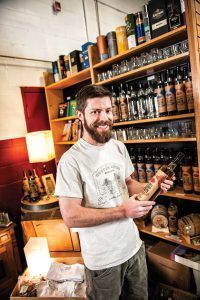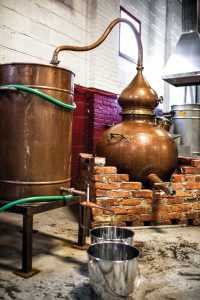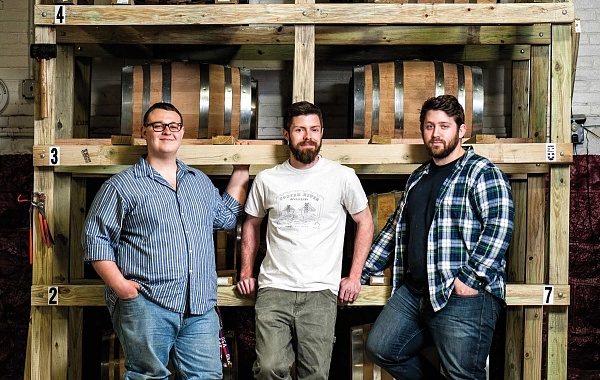Sometimes, when people stop by looking for an oil change, the guys at Cooper River Distillers laugh and offer them a drink.
The first time you visit, you may have to drive around the block once or twice before you spot your destination, a Prohibition-era automotive garage expertly camouflaged in downtown Camden. Butstep inside, and you’re immediately struck by the smoky, tangy smell of molasses and rye being slowly distilled into small-batch, craft liquors.

Yoakum now sells three flavors of Petty’s Island Rum
This hole-in-the-wall existence was exactly what James Yoakum, 30, had in mind when he first considered opening a distillery. The Kentucky native was a successful Philadelphia realtor for six years after graduating from the University of Pennsylvania’s Wharton School, but found himself feeling increasingly restless.
“I thought I wanted to be the next Donald Trump,” Yoakum says. “But then I started to feel like I really wanted to be doing something hands-on. I didn’t want to sit in front of a computer or be on the phone all day.”
At the time, Yoakum was brewing beer at home, and in 2010 he began to think it could become more than a hobby. While craft breweries were proliferating all over the East Coast, there was not a single craft distillery in New Jersey – and in fact, there hadn’t been since the end of Prohibition in 1933. That was in large part due to strict liquor laws, which made distilling and distributing on a small scale cost-prohibitive.
Under the old law, distilleries were required to pay an annual license fee of $12,500. In 2013, Gov. Chris Christie signed a bill that reduced the yearly cost to $938 and allowed public tours and tastings. While those changes inched their way through the legislature, Yoakum was laying plans for Cooper River Distillers, which would ultimately be the second post-Prohibition distillery to open in the state and the first-ever legal distillery in Camden, as far as Yoakum knows.
“The process was long and frustrating,” he says. “Part of that was being a brand new industry. The whole state was like, ‘We don’t know how to do this – no one has done this in 80 years.’ Another part of the reason it took so long was that it’s hard to get things done in Camden. We moved into the building in September 2012, and then it was more time to get everything up to code. It took almost two years to get licensed. This is not an easy place to do business, but there’s such a payoff if you stick with it.”
Yoakum officially received his distiller’s license in April of 2014. By then, he had transformed the long-empty garage into an inviting space that is equal parts warehouse, laboratory and living room. He says visitors love having a drink at the bar amid the equipment that produces the liquor, and while there are plans to beautify the distillery a bit, he wants to preserve that informal atmosphere.
“We’ll eventually have some kind of décor, but you’ll always know you’re in a distillery,” Yoakum says. “We never intended to be open to the public, and the law didn’t really allow us to sell stuff here. So I always planned for this to be a factory, and that’s what it looks like. But then the law changed, and of course Camden said, ‘Please open up, please be a tourist attraction, bring people in, show things off.’”
Yoakum acquiesced, and Cooper River Distillers is open to the public every Friday evening. An average of 30 people – a mix of locals, commuters and liquor connoisseurs – show up each week to sip cocktails and throw darts. It’s an opportunity for Yoakum and his employees to relax; the rest of the time, they’re busy producing a weekly average of 240 bottles of rum in three varieties.
The distillery’s first product was Petty’s Island Rum, named for the island in the Delaware River where Captain Blackbeard is said to have docked his ship on visits to Philadelphia.
“Most people who are from here have heard of it,” Yoakum says. “And it was really cool to have a local name, but it also sounds like a rum. Petty’s Island could easily be a place in the Caribbean. It makes you think of beaches and pirates.”
The distillery currently produces white, aged and spiced rums, and Yoakum expects to begin bottling rye whiskey and bourbon soon.
“Being from Kentucky, obviously what I really want to do is bourbon,” he says. “That’s really the point of this – to be a bourbon distillery – but bourbon has to age in barrels, and me being kind of snobby, I want it to age for a long time and not take any shortcuts. But white rum only takes about two weeks from start to finish, so I knew we could make good rum quickly, get it out and on the market, and then take our time with the whiskeys.”

The distillery’s copper Alembic still was handmade in Spain
Most days, Ben Donia and TJ Kaplan, the only other employees of Cooper River Distillers, are in constant motion. There are hundreds of gallons of water to be boiled and mixed with gallons of molasses. There are pounds of yeast to add and barrels at various stages of fermentation that need stirring. The giant, hammered-copper centerpiece of the operation – an Alembic still handmade in Spain – is constantly running, churning out a new batch of pure liquor. And between batches, all the equipment has to be thoroughly cleaned.
It’s hard work, but Donia and Kaplan, both South Jersey locals in their 20s, don’t seem to mind. Yoakum isn’t afraid to get his hands dirty either; he doesn’t hesitate to clamber onto a shelf and wrap his arms around a giant bag of molasses, squeezing out the last drops of a 275-gallon supply.
The punishing production schedule is a mark of success for the distillery. Yoakum says that in the beginning, the rum sold out as soon as it was bottled.
“For a long time, it was out the door as fast as we made it,” he says. “I had liquor stores calling around the holidays and asking for four cases. I’d have to say, ‘You can have two now and two when we bottle more next week.’ It took a long while to get up to speed, but now we’re actually starting to build some inventory. We’re putting stuff in barrels and dumping barrels into bottles now, whereas for a long time we were just putting stuff in. We’re getting into a cycle, and in the last few months things have started going to another level.”
Petty’s Island Rum is widely available at liquor stores and eateries in South Jersey and Philadelphia, and Yoakum uses color-coded thumbtacks to mark the product’s spread on a map of the region. He is beginning to add thumbtacks in North Jersey, though he says it’s a tougher sell to people with no connection to Camden.
“The further away you get, the harder it is,” he says. “It can be hit-or-miss. Around here, it’s much easier. Some people hear it’s local and they just buy a case – they don’t even need to taste it. People know Petty’s Island, and everyone knows Camden. The price is sometimes a sticking point – the white rum starts around $24, and prices go up from there – but a lot of stores around here say customers come in all the time and ask what’s new and different, and they’re willing to pay for something local. We can sell in South Jersey and Philadelphia just fine, and I don’t necessarily want it to be everywhere. If it’s never in a store in California, that’s fine with me. I want to be a little bigger than we are now, but I don’t want to be Bacardi or Jack Daniels. I knew what I was doing when I picked the name of a little island in the Delaware River.”
Yoakum is a believer in reciprocity, and he does his best to support local businesses, both in and out of the Camden city limits.
“We want to be a good neighbor,” he says. “We donate to a lot of local events. It’s important to us that we’re part of the community. As a tiny startup, it’s hard to know what that means at this point, but I chose this city for a reason, and we want to make sure we’re doing our part.”
Whenever possible, Yoakum buys his rye, barley and corn from local farmers. He’s unconcerned about potential competition and even hosts regular workshops to help other aspiring distillers in the area navigate the legal end of liquor production.
“When we opened, I was getting multiple calls every week from people who wanted to know how to get licensed,” Yoakum says. “So I came up with the idea to do an all-day seminar one Saturday. We had 15 tickets, and they sold out instantly, so we had two more seminars, and they sold out instantly too. I’ll do one every three or four months. I want to share what I’ve learned. I don’t want to tell people, ‘Oh, figure it out on your own like I did,’ because there’s no handbook on how to start this. And the workshops are good for us too, because now we know all the guys who are thinking of getting into it. We know more about New Jersey distilling than anyone. It feels like we’ve got our finger on the pulse.”
While Yoakum would be happy to see more local craft distilleries, he is quick to point out the future of South Jersey distilling has its foundations in Camden.
“I’ve always thought the most interesting thing about liquors is that they’re tied to places,” he says. “Like Caribbean rum, Scottish scotch, Kentucky bourbon; they’re special because of the particular way they do things in that place. One thing I hope comes from our workshops is some of the quirky stuff we do gets passed on to other distilleries that open here, and eventually people will say, ‘Oh, in New Jersey they do this thing…it’s the Camden County process.’ That’s the legacy I want for the distillery and the liquor we make. That’s why we’re here – for the legacy, the character and the history. That’s why we can be proud that every bottle says ‘Distilled in Camden, N.J.’”










